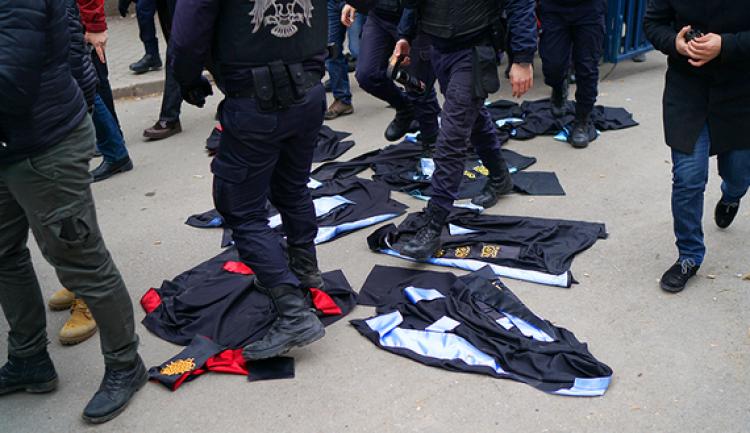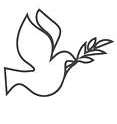
Like its fragile democracy, academic freedom has never been consolidated in Turkey. The budding vibrancy of university campuses in the 1960s gave way to growing political violence and radicalism during the 1970s. Hundreds of left-leaning academics were purged after the military coup of September 1980. Thousands more resigned, withdrew from public life or left the country under conditions of military dictatorship. The institutional legacy of that coup and the damage it inflicted on the country’s intellectual life have been far-reaching and enduring.
Yet even by the standards of its troubled past, the academic purges sweeping Turkey today are unprecedented in scope and intensity. Since the twin elections of June and November 2015, the country has been in a freefall into spiraling crises, violent conflict and an authoritarian power grab. From the resurgence of extreme violence in the Kurdish southeast in 2015, the bloody coup attempt of July 2016 and the subsequent crackdown on dissent, to President Recep Tayyip Erdogan’s unflinching resolve to change the country’s system of parliamentary democracy with a powerful executive presidency, tensions have been mounting relentlessly on a bitterly divided society that seems ever closer to a mass nervous breakdown.
It is especially at such periods of extreme tension and polarisation that the agora of enlightened debate and independent thinking at universities should provide principled discourses, cool-headed analyses, new spaces of dialogue and ways out of seemingly intractable conflicts. This is precisely why the Turkish government’s ongoing assault on the academia is extremely disconcerting and bears dire consequences for the country’s near and long-term future.
Since last July, more than 4,000 academics have lost their positions in public and private universities by executive decree. Fifteen private universities linked to the network of Fethullah Gülen, a Sunni cleric and President Erdogan’s former ally, who is accused of being behind the coup attempt, have been shut down. Those who are purged from public institutions are virtually sentenced to a civilian death without trial: they cannot take up public office anywhere else, cannot be hired by private institutions due to fear of retribution from the government, and cannot seek employment abroad as they are barred from leaving the country.
The economic burden and the emotional trauma of this state of paralysis is taking an increasingly heavy toll on the targeted scholars, as well as their families and the wider academic community. In late February, two academics who were purged with an executive decree took their own lives after suffering psychological breakdown. Such tragedies are likely to keep unfolding as long as the emergency laws remain in place.
Retrospective criminalisation
Particularly alarming is the ongoing effort to retrospectively criminalise academic research and activities on issues that were only a couple of years ago being openly and extensively debated in the public sphere. One subject that is untouchable again beyond the official discourse of the government is the Kurdish conflict and the state’s role in the violence and destruction that surged after mid-2015. Having signed a petition in January 2016 condemning the state’s militaristic policies in the Kurdish provinces and calling for a return to negotiations, a group of over 2,000 academics has since become the target of the government’s invective.
Known as the ‘Academics for Peace’, the signatories were labelled by President Erdogan as pseudo-intellectuals, traitors and supporters of terrorism. They have been targeted and harassed by ultra-nationalist mobs and mafia bosses, and subjected to investigation by university administrations and state prosecutors. Following the coup attempt, at least 383 signatories, many of them leading academics in their fields, have lost their jobs under the emergency laws ostensibly put in place to protect rule of law and democracy, but are in fact being used to suppress a wide range of government critics.

Join the solidarity campaign
Another subject that is now off-limits is the Gülen movement itself, which over the past two decades had become a major socio-economic force internationally and a controversial political actor in Turkey, and has subsequently drawn considerable academic attention. Scholars who have conducted research about the relationship between religion, business and politics in Turkey, and have established contacts with Gülen supporters and business affiliates in the process, now risk being labelled as coup supporters or ‘FETÖcü’, i.e. supporter of the ‘Fethullahist Terror Organization’, the official name used by the government to refer to the movement.
A prominent example of this retrospective criminalization is Professor İştar Gözaydın, an eminent scholar of law and religion with international renown, who has written and spoken extensively on secularism, religious minorities and the role of the Diyanet (the Presidency of Religious Affairs) in Turkey. The former chair of the sociology department in the now-defunct Gediz University, she was sacked after the coup attempt, detained last December, and finally charged this week with being a “member of an armed terrorist organisation”. She faces a prison sentence of up to 15 years.

Professor İştar Gözaydın
During a brief period of relative openness in the late 1990s and the 2000s, parts of academia emerged as spaces where Turkey’s society could for the first time engage in candid soul-searching and mature discussions about the country’s long-standing national and historical taboos. The present atmosphere of authoritarian clampdown, taking place in the backdrop of extreme societal polarization, institutional paranoia and hyper-nationalism, is undoing that fragile progress and setting the country back by many decades. At the same time, stripped of the last vestiges of its institutional autonomy, academia is fast becoming a desolate place devoid of any critical thinking.
Take Action!
That is why there is an urgent need to take action to safeguard what’s left of the country’s critical scholarship and lend support to its beleaguered academics. Such support can include backing this important civil society initiative to provide much needed financial assistance to the purged ‘Academics for Peace’, petitioning the Turkish government for the release of Prof. Gözaydın, or mobilising your home university to host a scholar at risk.
As Turkey’s social fabric comes apart at its seams, what is at stake is not just the country’s democratic institutions but also its future as a viable state and society. Supporting persecuted scholars is not only a moral imperative for those who believe in the universal value of free speech and independent scholarship. It may also be the only practical way to protect the country’s intellectual capital from mindless destruction, the repercussions of which would be felt far beyond our time and Turkey’s borders.
